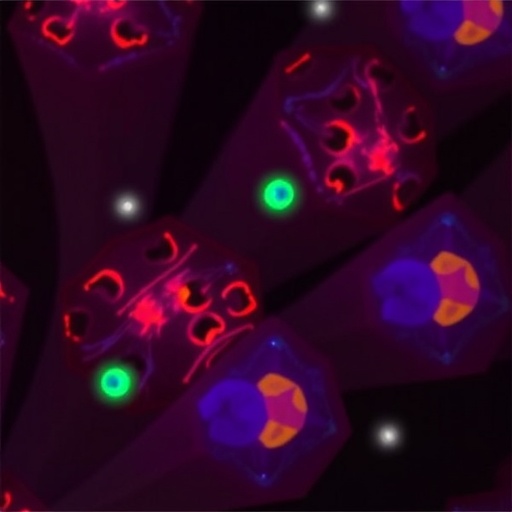In the realm of genetic research, a significant breakthrough has emerged surrounding the ATXN7L3B gene, illuminated by a recent study conducted by Degtyareva et al. This study centers on an intriguing genetic variant, G→C rs590352, located within the protein-coding region of the ATXN7L3B gene. What makes this discovery particularly noteworthy is the variant’s profound effect on gene expression in living organisms. As the complexities of genetic regulation continue to unfold, this revelation sheds light on potential avenues for therapeutic interventions in genetic disorders.
The ATXN7L3B gene plays a crucial role in neuronal function and cellular signaling pathways. It encodes for a protein that is involved in various biological processes, including cellular growth and differentiation. Given the gene’s significant implications on neurodegenerative diseases and other genetic disorders, understanding how its expression is regulated is of paramount importance for both researchers and clinicians alike.
The study conducted by Degtyareva and colleagues employed an innovative research approach, utilizing advanced methodologies to dissect the effects of the G→C rs590352 variant on ATXN7L3B expression. By employing in vivo experimentation, the researchers were able to observe the consequences of the genetic modification in a physiological context. Their findings confirm that this specific single nucleotide polymorphism (SNP) functionally upregulates the expression of the ATXN7L3B gene, providing critical insights into its regulatory mechanisms.
The implications of this upregulation are extensive. In various pathogenic contexts, altered expression levels of genes can lead to a cascade of biological effects, potentially culminating in disease. In neurodegenerative diseases, where protein misfolding and aggregation are common, understanding the regulatory factors that control protein levels becomes vital. The enhanced expression of ATXN7L3B due to the G→C rs590352 variant offers clues about possible gene-dosage effects that could influence disease progression.
Additionally, the interplay between genetic variants and environmental factors is a key aspect of gene regulation that cannot be overlooked. The research highlights the importance of considering the context in which these genetic modifications occur. This is particularly relevant in complex traits and diseases where multiple genetic players and external factors contribute to the phenotype.
The collaboration among researchers in the study underscores the importance of interdisciplinary approaches in genetic research. By integrating genetics, molecular biology, and computational modeling, the team was able to generate a more comprehensive understanding of the mechanisms driving gene regulation. This holistic perspective can pave the way for future studies aimed at revealing additional layers of complexity in gene expression regulation.
Moreover, the study raises pivotal questions regarding the potential role of the ATXN7L3B gene in therapeutic development. As researchers look to harness the powers of genetic engineering and therapy, understanding the nuances of gene regulation becomes paramount. The discovery of how specific SNPs influence gene expression could guide the development of targeted therapies aimed at ameliorating the effects of dysfunctional gene expression in various diseases.
Looking forward, the research community is excited about exploring the potential applications of these findings. Potential therapeutic interventions could include the development of small molecules or gene-editing techniques designed to either mimic or counteract the effects of the G→C rs590352 variant. This emerging landscape in genetic therapy holds promise for transformative approaches to treating genetically influenced diseases, which have long been elusive targets for pharmacological intervention.
As we reflect on the significance of the G→C rs590352 variant, it is worth noting that this discovery contributes to the broader discourse on personalized medicine. In an era where treatment is increasingly tailored to genetic profiles, understanding how variations in our DNA affect gene expression and, subsequently, health is key to advancing medical science. Personalized approaches could revolutionize how we understand diseases and manage patient care, enabling practitioners to devise strategies that are tailored to the individual’s genetic makeup.
The research by Degtyareva et al. serves as a powerful reminder of the complexity of genetic regulation and the continued need for rigorous investigation in this field. The evolving landscape of genomics is one where discoveries can lead to profound advances in understanding the genetic bases of health and disease. This study not only enriches our knowledge but also lays the groundwork for future investigations aimed at untangling the intricate web of genetic interactions governing human biology.
As with any scientific study, additional research is warranted to fully realize the implications of these findings. The understanding of gene regulation is an ever-evolving field, and researchers are now tasked with expanding on this work to explore the pathways and networks that ATXN7L3B engages within cells. By further delineating these interactions, researchers can gain insights that contribute to improving therapeutic strategies and patient outcomes in the future.
In conclusion, the implications of the G→C rs590352 variant on the ATXN7L3B gene signal an important leap in genetic research. This intricate relationship between gene variants and expression levels offers promising avenues for understanding and potentially treating genetic diseases. As the scientific community delves deeper into the mechanisms underpinning these relationships, the awakenings surrounding ATXN7L3B may indeed usher in a new era of tailored therapeutics and enhanced understanding of genetic contributions to human health.
Subject of Research: The effect of the G→C rs590352 variant on ATXN7L3B gene expression.
Article Title: The G→C rs590352 in the Protein-Coding Region of ATXN7L3B Gene Upregulates Its Expression In Vivo.
Article References: Degtyareva, A., Antontseva, ., Ershov, N. et al. The G→C rs590352 in the Protein-Coding Region of ATXN7L3B Gene Upregulates Its Expression In Vivo. Biochem Genet (2025). https://doi.org/10.1007/s10528-025-11271-4
Image Credits: AI Generated
DOI: https://doi.org/10.1007/s10528-025-11271-4
Keywords: ATXN7L3B, G→C rs590352, gene expression, genetic regulation, neurodegenerative diseases, therapeutic interventions, personalized medicine, genetic variants.




